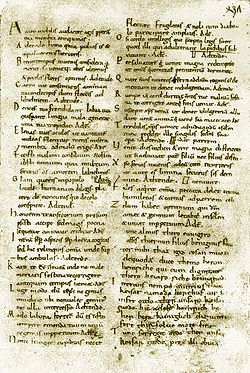Medieval Latin
Appearance
| Medieval Latin | |
|---|---|
 Carmina Cantabrigiensia, Medieval Latin manuscript | |
| Native to | Many small states |
| Region | Most of Europe |
| Era | Developed from Late Latin between 4th and 10th centuries; replaced by Renaissance Latin from the 14th century |
Indo-European
| |
Early forms | |
| Latin alphabet | |
| Official status | |
Official language in | De facto in most Christian states during the Middle Ages |
| Language codes | |
| ISO 639-3 | – |
lat-med | |
| Glottolog | None |
 Europe, 1000 AD | |
Medieval Latin was the form of Latin that was used in the Middle Ages. It was used mostly by scholars and as the liturgical language of the medieval Roman Catholic Church, but it was used also as a language of science, literature and administration.
Despite the clerical origin of many of its authors, Medieval Latin should not be confused with Ecclesiastical Latin. There is no consensus on exactly when Late Latin ends, and Medieval Latin begins. Some scholars have their surveys of it begin with the rise of early Christian Latin in the mid-4th century, but others have around the year 500.[1]

Important Medieval Latin authors
[change | change source]4th-5th centuries
[change | change source]6th-8th centuries
[change | change source]- Gildas (d. c. 570)
- Venantius Fortunatus (c. 530-c. 600)
- Gregory of Tours (c. 538-594)
- Isidore of Seville (c. 560-636)
- Bede (c. 672-735)
9th-10th centuries
[change | change source]- Ratherius (890-974)
- Thietmar of Merseburg (975-1018)
Notes
[change | change source]- ↑ Jan M.Ziolkowsky, "Towards a History of Medieval Latin Literature", in: F. A. C. Mantello and A. G. Rigg (eds.), Medieval Latin: An Introduction and Bibliographical Guide (Washington, D.C., 1996), pp. 505-536 (pp. 510-511)
References
[change | change source]- K. P. Harrington, J. Pucci, and A. G. Elliott, Medieval Latin (2nd ed.), (Univ. Chicago Pres, 1997) ISBN 0-226-31712-9
Other websites
[change | change source]- Wright, Thomas, ed. A Selection of Latin Stories, from Manuscripts of the Thirteenth and Founteenth Centuries: A Contribution to the History of Fiction During the Middle Ages. (London: The Percy Society. 1842.)
- Mental furniture from the philosophers, article on the influence of medieval Latin on modern technical vocabulary.
